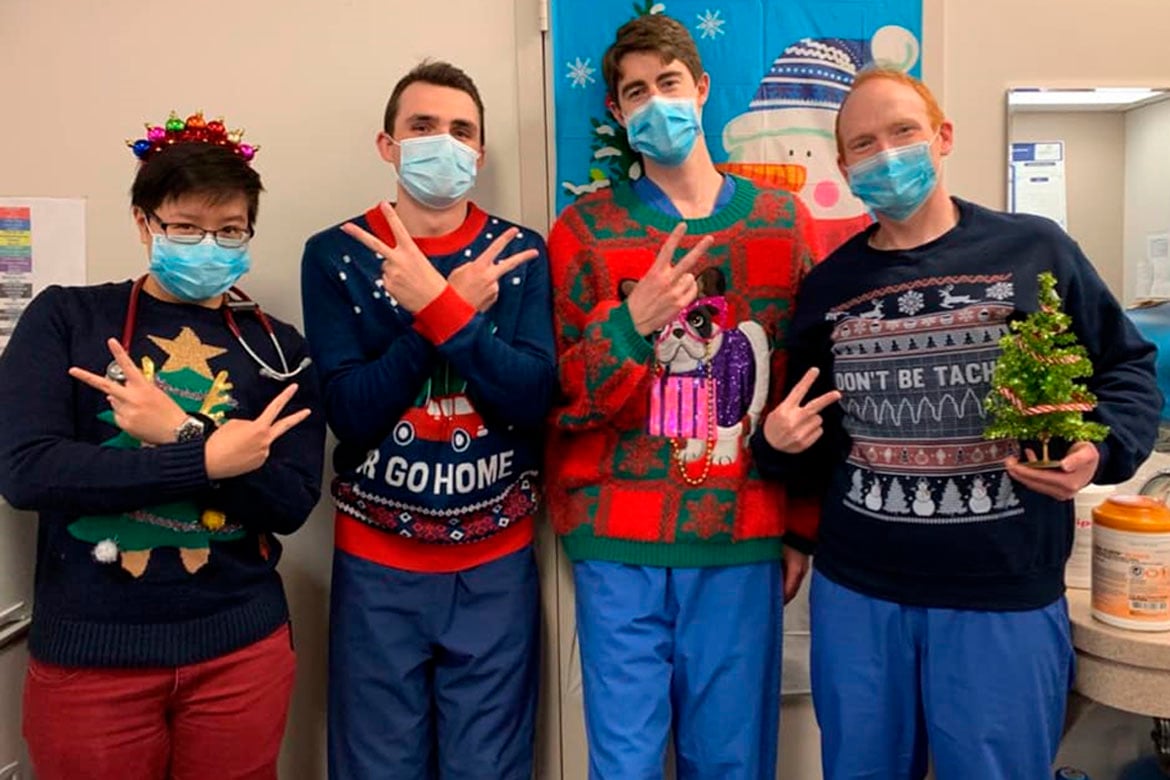For many resident physicians, the end-of-year holiday season often means being far from home, working long hours in unfamiliar cities and missing cherished family traditions. While trading festive traditions for charting may not feel particularly merry, spending the end-of-year holidays in a hospital doesn’t have to be without joy.
Now an assistant professor of hematology and oncology in New Mexico, David Savage, MD, PhD, spent several holiday seasons working during residency and fellowship. During those periods Dr. Savage was able to find camaraderie and even festivity.
As the end-of-year holiday season approaches, he offered residents tips on how they can make the most of holidays on the wards.
Plan ahead
As an internal medicine intern in Cleveland, Dr. Savage was given his schedule 12 months ahead of time. He knew then that he would be unable to travel back to his family in the Dallas area on Christmas. He also knew he’d have New Year’s Eve and Day off.
“We made a plan to shift things, so we had our Christmas celebrations on New Year’s,” said Dr. Savage, an AMA member. For our family dynamic that ended up working well.”
Turn to the AMA Thriving in Residency series for timely guidance on making the most of your residency training. Get resources and tips about navigating the fast-paced demands of training, getting scientific research published, maintaining health and well-being, and handling medical student-loan debt.
Focus on your mission
Maximum flexibility in one’s schedule is unlikely to be the motivating factor that pushed one into medicine. A desire to help patients is. Focusing on the meaning of your work during holidays can have a profound impact on one’s outlook, Dr. Savage said.
“A lot of the caregivers working during the holidays—be it nurses or doctors or other health professionals—everyone felt that same sense of service,” Dr. Savage said. “Working on the holidays, you have to keep in mind that patients don't want to be there either. For me, it spoke to my desire to serve the community at an important time, which is holidays.”
Dive deeper:
- How to get time off for professional development during residency
- What medical residents do to make the most of their time off
- Key tips to weather night shifts as a PGY-1
Find camaraderie among peers
While many residents may be far from family, they are surrounded by peers in similar circumstances. Dr. Savage was able to celebrate the season with other residents.
“Two of our senior residents rented a big house in Cleveland,” Dr. Savage said. “Around the holidays like Christmas and Thanksgiving, they would host a potluck dinner. We would have a nice meal together and take pictures and we would play games together and it was a really fun thing that we all look forward to.”
Trading shifts is possible
As an intern working in a hospital setting, you are likely going to have to work at least two of Christmas, Thanksgiving and New Year’s. If your schedule doesn’t allow you to get your most important holiday off, it is possible to trade with a peer. You might have to pay a premium to do it, however.
"I saw people who were able to make trades to get a certain holiday date off,” he said. It depends on how much you want it. You might need to take some extra night shifts or other weekends that people don’t want. I didn’t care that much, so it wasn’t a big priority for me to switch."
Dive deeper:
- Nervous about your intern year? Three resident physicians offer insight
- Three ways to save time on personal tasks during residency training
- What I wish I knew in residency about succeeding as a PGY-2
- 3 ways to save time on personal tasks during residency training
Maintain perspective
Dr. Savage said that, as his training went on, he was able to get more schedule flexibility for the holiday seasons—though as a resident he always had to work at least one of the big three end-of-year holidays.
Dr. Savage advised interns to keep in mind that in many specialties, holiday shifts are limited to their time in training. Dr. Savage, for example, now works in a hematology and oncology clinic setting in which he will rarely be required to work a major holiday.
The fact that Dr. Savage was able to see his loved ones at all during the end-of-year holiday season was another thing he felt grateful for. Many of his colleagues, particularly those from other countries, faced even greater challenges in going home for the holidays. Some couldn’t travel due to cost or visa issues.
“That put things into perspective,” he said. “These folks—they can't even leave the country. It brought me joy again to celebrate with them and lift their spirits.”
Show spirit at work
Hospitals are often decorated for the season, and Dr. Savage found that leaning into that can create a more fun environment for both patients and physicians.
He recalled having “to work an overnight shift right before Christmas ... and my co-residents and all fun holiday sweaters.” He added: “We all wore scrub bottoms and our holiday sweaters for our shift because we knew that when our shift was over the next morning, it was going be Christmas Day.
"To me, those kinds of moments where you spent a holiday at the hospital and got this really fun camaraderie with peers, those are the things that really stand out to me and that I remember more than just the day-to-day of being a resident."




